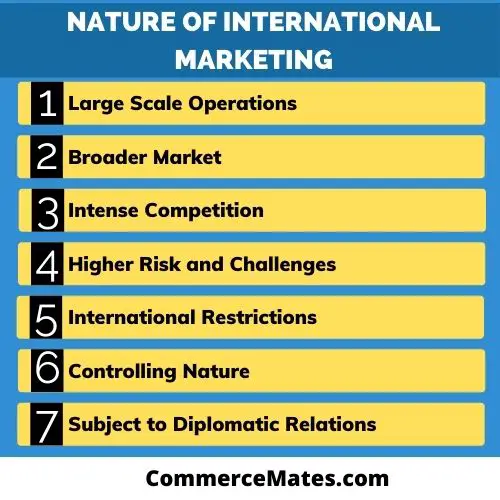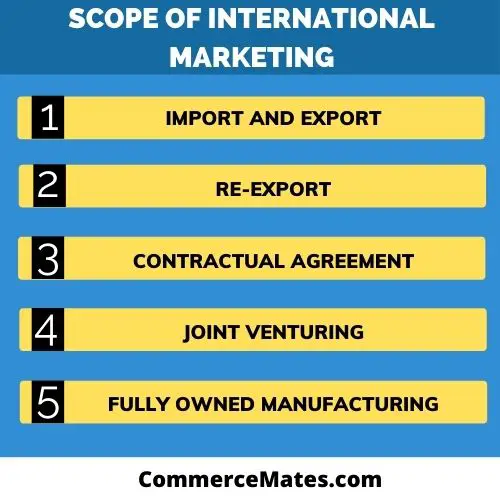International marketing refers to marketing which is done globally in several nations. It is a marketing which is done across national borders for fulfilling the needs of peoples worldwide. International marketing is also known as Global marketing. It is the one which enables companies in reaching out to customers internationally.

Contents
Nature of International Marketing
Large Scale Operations
International marketing consists of large scale operations to be performed by business for promoting their products in many countries. It requires huge amount of labor and capital for meeting out the needs of large peoples at international level.
Broader Market
It provides wider platform for advertising products at an international level. Business can target their products among large population residing in different nations. Marketing is not limited to any local area or nation but is free for all across the globe.
Intense Competition
International marketing faces an intense competition due to the presence of both domestic and international competitors. Organizations at a global level have to compete with both of these competitors which leads to stiff competition in international market.
Higher Risk and Challenges
Marketing at an international level involves a large amount of risk and challenges as it is dependent upon various factors and conditions. These risks arise due to political factors, cultural and regional differences, language barriers, changing styles and fashions of customers, sudden war or changes in government regulations.
International Restrictions
Organizations in international market need to follow all tariff and non-traffic constraints. There are various restrictions imposed due to differences in rules and regulation among nations at global level. All nations perform import and export following the restrictions imposed in international market.
Controlling Nature
International market is dominated by developed countries and multinational corporations due to their global presence. Developed countries due to the presence of advanced technology and worldwide reach are able to perform business operations efficiently everywhere.
Subject to Diplomatic Relations
International marketing is subject to the diplomatic relations between countries. Organizations enter into international market of those countries with which its home country share better cordial relations. There is no trade in between the nations having clash with one another.

Scope of International Marketing
Import and Export
International marketing provide business an opportunity to enter global market for conducting trade. Export refers to selling its products in another country for earning high revenues. Import involves buying goods from foreign market and selling it in domestic market. These activities help business in expanding their operations and earning better profits.
Re-export
Re-export is an activity under which companies imports semi-finished goods, process these goods for transforming them into finished products and export them to foreign countries.
Contractual Agreement
International marketing exposes business to global market for expanding their operations. Companies enters into contract with other companies overseas for performing certain operations. Agreement are entered into in form of co-production, licensing and technical assistance. It raises the customer base, expands the market and overall profitability of business.
Joint Venturing
Joint venture is the one where two brands associate with one another for starting a new business. They perform all activities together and share revenue in pre-decided ratio. Partnership with domestic brands in foreign land help companies in easily understanding the market dynamics.
Fully Owned Manufacturing
Under this, companies set up their own manufacturing unit in foreign land. They themselves manufacture goods and promote on their own. It will help in minimizing cost and maintaining the quality. Establishing of manufacturing unit in foreign company will overcome all issue like cost differences, government policies and trade barriers.